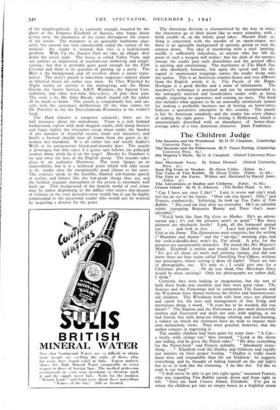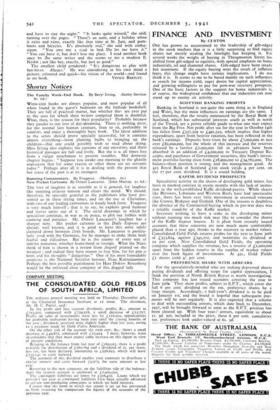The Children Judge
(Faber. 5s.)
"C I have any ones I like?" Lucy is seven and can't read, but has an eye to the future. "How can you know? Silly," said Francis, combatively. Softening, he took up Ten Tales of Tim Rabbit. "She read me four after tea yesterday. He's an adorable rabbit (excepting Benjamin Bunny and Peter that's more adorable)."
"You'd both like Sam Pig Goes to Market. He's an adven- turous pig ; it's sad the pictures aren't so good." "But these pictures are absolutely lovely ! Look, all the farmyard spread out . . . and look at this. . . ." Lucy had picked out The Visit to the Farm. The illustrations were exquisite, but the writing (" Mtumnie and Auntie" and the " tig-tigs," meaning pigs, and the cock-a-doodle-doo) won't do, I'm afraid. A pity, for the pictures are exceptionally attractive. Pat would like His Majesty's Mails. Elizabeth is twelve and would have liked them herself. "It's got all about air mails and printing stamps, and did you know there are four trains called Travelling Post Offices, without any passengers' where sorting is done all night? There are lots of photographs, too. It's only 25. ; I could give one for a Christmas present. . . . Or do you think Our Merchant Navy would be more exciting? Only the photographs are rather dull, I think."
Certainly they were lacking in imagination, but the text of both these books was excellent and they were good value. The Seasons and the Fisherman and its companion The Seasons and the Woodman were shared between the twelve and fourteen-year- old children. The Woodman book tells how trees are planted and cared for, the uses and management of that living and mysterious thing, a wood. "It even has to be weeded, did you know? " The Seasons and the Fiskerman is also most attractively written and illustrated and deals not only with angling, as we had feared, but with deep-sea fishing, whaling and seal-hunting, a subject on which the reviewers have no wish to impose their own melancholy views. They were grateful, however, that the author concurs in regretting it.
The smaller children had been quiet for some time : "A Cat— a lovely, wild, stringy cat," they crooned. "Look at the clever one hiding, and he gives the Parrot rides." "He does everything for the Parrot-bird," said Francis ardently. "Absolutely every- thing. . . ." Elizabeth took the Dudley and Gilderoy and rapidly put matters on their proper footing. "Dudley is really much more wise and responsible than the cat Gilderoy : he suggests everything, and he thought of hiding himself on the old lady's hat so as to look like the trimming. I do like this I'd like to read it out loud."
"I shall never be able to get this right again," mourned Francis, who was regarding Tim Rabbit upside down and from right to left. "Give me back Crusoe Island, Elizabeth. I've got to where the children get into an empty house in a frightful storm
and have to stay the night." "It looks quite wizard," she said, turning over the pages. "There's an aunt, and a holiday when it rains and rains, exactly like that time at St. Just, and gum- boots and bicycles. It's absolutely real," she said with enthu- siasm. "You owe me a read in bed. Do let me have it." "You can have it, but don't lose my place. I read another book once by the same writer and she seems to me a modern E. Nesbit ; not like her, exactly, but just as good."
The smallest child pondered: "Its dangerous to play with bee-hives. Always." He was considering in his own mind a picture, coloured and quick—his vision of the world—and found























 Previous page
Previous page